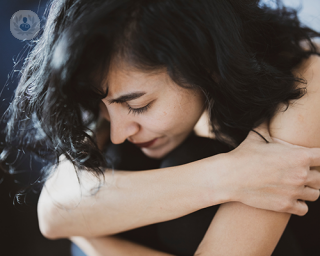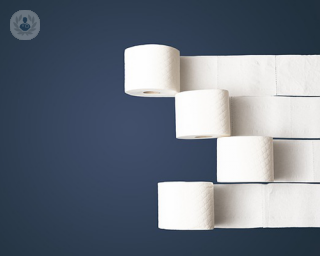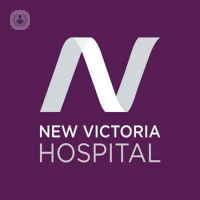What is bowel incontinence?
Bowel incontinence, also referred to as fecal incontinence, describes an inability to control bowel movements, leading to an involuntary leakage of stool from the rectum. It can range from occasional leakage of small amounts of stool to a complete loss of bowel control. It is thought that as many as one in ten people will experience some degree of bowel incontinence in their lifetime, and is nothing to be ashamed of. It is usually symptomatic of another problem or underlying condition, and is not a normal part of ageing. It usually won’t just go away on its own, but it can be treated effectively, and often cured, so it is always best to consult a GP or a specialist.

What are the symptoms of bowel incontinence?
Bowel incontinence itself is usually a symptom, not a condition on its own. It may occur as a sudden need to go to the toilet, but the patient may not make it in time (urge bowel incontinence). However, other patients have no warning before they soil themselves, feeling no sensation as the stool passes (passive incontinence/passive soiling). Passing wind may also cause slight soiling.
Bowel incontinence can have a significant impact on a person's quality of life, and lead to emotional and social challenges.
What causes bowel incontinence?
Most cases of bowel incontinence are brought on by bouts of diarrhoea, or conversely, constipation. Another common cause is weakening of the anal sphincter (the ring of muscle that opens and closes the anus).
Long-term causes, such as diabetes, multiple sclerosis, spina bifida, and even dementia can also cause bowel incontinence.
How can it be prevented?
Maintaining a healthy diet and lifestyle can help to reduce the chances of getting diarrhoea or constipation, which are the leading causes of bowel incontinence. This can also stave off type 2 diabetes. However, there is no guarantee of preventing these problems, and there is nothing that can be done to prevent causes such as multiple sclerosis or dementia.
What is the treatment for bowel incontinence?
Luckily, bowel incontinence is highly treatable, enabling most patients to maintain normal bowel function for the rest of their lives. Different treatments include:
- Exercises to strengthen the bowel muscles and anal sphincter.
- Dietary and lifestyle changes – a healthier diet and lifestyle can prevent diarrhoea and constipation.
- Medication can also treat diarrhoea and constipation, depending on the cause.
- There are various surgical options.
- Incontinence products, e.g. anal plugs, incontinence pads, etc. can help to manage the symptoms until you regain some control
In many cases, incontinence can be cured, but even if not it is usually possible to improve bowel control to some degree, and significantly improve the symptoms.
11-13-2012 10-19-2023Bowel incontinence
Dr Richard Sarsam - Gastroenterology
Created on: 11-13-2012
Updated on: 10-19-2023
Edited by: Jay Staniland
What is bowel incontinence?
Bowel incontinence, also referred to as fecal incontinence, describes an inability to control bowel movements, leading to an involuntary leakage of stool from the rectum. It can range from occasional leakage of small amounts of stool to a complete loss of bowel control. It is thought that as many as one in ten people will experience some degree of bowel incontinence in their lifetime, and is nothing to be ashamed of. It is usually symptomatic of another problem or underlying condition, and is not a normal part of ageing. It usually won’t just go away on its own, but it can be treated effectively, and often cured, so it is always best to consult a GP or a specialist.

What are the symptoms of bowel incontinence?
Bowel incontinence itself is usually a symptom, not a condition on its own. It may occur as a sudden need to go to the toilet, but the patient may not make it in time (urge bowel incontinence). However, other patients have no warning before they soil themselves, feeling no sensation as the stool passes (passive incontinence/passive soiling). Passing wind may also cause slight soiling.
Bowel incontinence can have a significant impact on a person's quality of life, and lead to emotional and social challenges.
What causes bowel incontinence?
Most cases of bowel incontinence are brought on by bouts of diarrhoea, or conversely, constipation. Another common cause is weakening of the anal sphincter (the ring of muscle that opens and closes the anus).
Long-term causes, such as diabetes, multiple sclerosis, spina bifida, and even dementia can also cause bowel incontinence.
How can it be prevented?
Maintaining a healthy diet and lifestyle can help to reduce the chances of getting diarrhoea or constipation, which are the leading causes of bowel incontinence. This can also stave off type 2 diabetes. However, there is no guarantee of preventing these problems, and there is nothing that can be done to prevent causes such as multiple sclerosis or dementia.
What is the treatment for bowel incontinence?
Luckily, bowel incontinence is highly treatable, enabling most patients to maintain normal bowel function for the rest of their lives. Different treatments include:
- Exercises to strengthen the bowel muscles and anal sphincter.
- Dietary and lifestyle changes – a healthier diet and lifestyle can prevent diarrhoea and constipation.
- Medication can also treat diarrhoea and constipation, depending on the cause.
- There are various surgical options.
- Incontinence products, e.g. anal plugs, incontinence pads, etc. can help to manage the symptoms until you regain some control
In many cases, incontinence can be cured, but even if not it is usually possible to improve bowel control to some degree, and significantly improve the symptoms.


How serious is a rectal prolapse and how can it be treated?
By Mr Rajeev Peravali
2024-11-21
Rectal prolapse can have a great impact on your quality of life. Learn from Mr Rajeev Peravali about its causes, if it can ever go away on its own and how a rectal prolapse can be treated to restore your quality of life. See more


Anal fistula: Symptoms, diagnosis and treatment
By Mr Anwar Ahmad
2024-11-19
Highly esteemed consultant laparoscopic, colorectal and general surgeon Mr Anwar Ahmad imparts expert advice on anal fistulas in this informative article, including symptoms, diagnosis and treatment. See more
Experts in Bowel incontinence
-
Mr Shahab Siddiqi
SurgeryExpert in:
- Irritable bowel syndrome (IBS)
- Itchy bottom
- Robotic surgery
- Rectal prolapse
- Bowel incontinence
- Dysmotility
-
Dr Natalia Zarate-Lopez
GastroenterologyExpert in:
- Indigestion (dyspepsia)
- Dysmotility
- Digestive diseases
- Constipation
- Bowel incontinence
- Nutrition
-
Mr Andrew Brian Williams
Colorectal surgeryExpert in:
- Anal fistula
- Anal fissure
- Piles (haemorrhoids)
- Inflammatory bowel disease (IBD)
- Bowel incontinence
- Pelvic floor
-
Professor Charles Knowles
Colorectal surgeryExpert in:
- Pelvic floor
- Constipation
- Bowel incontinence
- Diverticulitis
- Anal fistula surgery
- Rectal prolapse
-
Mr Ian Bloom
Colorectal surgeryExpert in:
- Colorectal cancer
- Colonoscopy
- Hernia
- Piles (haemorrhoids)
- Bowel incontinence
- Bowel cancer screening
- See all

New Victoria Hospital
New Victoria Hospital
184 Coombe Lane West, Kingston upon Thames, KT2 7EG
No existe teléfono en el centro.
By using the telephone number provided by TOP DOCTORS, you automatically agree to let us use your phone number for statistical and commercial purposes. For further information, read our Privacy Policy
Top Doctors

GI DOCTORS
GI DOCTORS
116 Harley Street, Marylebone, W1G 7JL
No existe teléfono en el centro.
By using the telephone number provided by TOP DOCTORS, you automatically agree to let us use your phone number for statistical and commercial purposes. For further information, read our Privacy Policy
Top Doctors

Cleveland Clinic London Colorectal Unit
Cleveland Clinic London Colorectal Unit
33 Grosvenor Place
No existe teléfono en el centro.
By using the telephone number provided by TOP DOCTORS, you automatically agree to let us use your phone number for statistical and commercial purposes. For further information, read our Privacy Policy
Top Doctors
-
New Victoria Hospital
184 Coombe Lane West, Kingston upon Thames, KT2 7EG, South LondonExpert in:
- Cardiology
- General Surgery
- Orthopaedic surgery
- Breast augmentation
- Pain management
- Spine
-
GI DOCTORS
116 Harley Street, Marylebone, W1G 7JL, W1G Marylebone LondonExpert in:
- Colorectal surgery
- Colonoscopy
- Inflammatory bowel disease
- Gastroenterology
- Hernia
- Irritable bowel syndrome
-
Cleveland Clinic London Colorectal Unit
33 Grosvenor Place, Central LondonExpert in:
- Cancer
- Colorectal surgery
- Minimal access surgery (keyhole surgery)
- Robotic Surgery
- Bowel cancer screening
- Inflammatory bowel disease
- See all
- Most viewed diseases, medical tests, and treatments
- Nutrition
- Weight loss injections
- Nipple discharge
- Abdominal pain
- Endovenous laser treatment (EVLA)
- Minimal access surgery (keyhole surgery)
- Head and neck cancer
- Neck lump
- Bariatric surgery
- Acellular dermal matrix (ADM)








